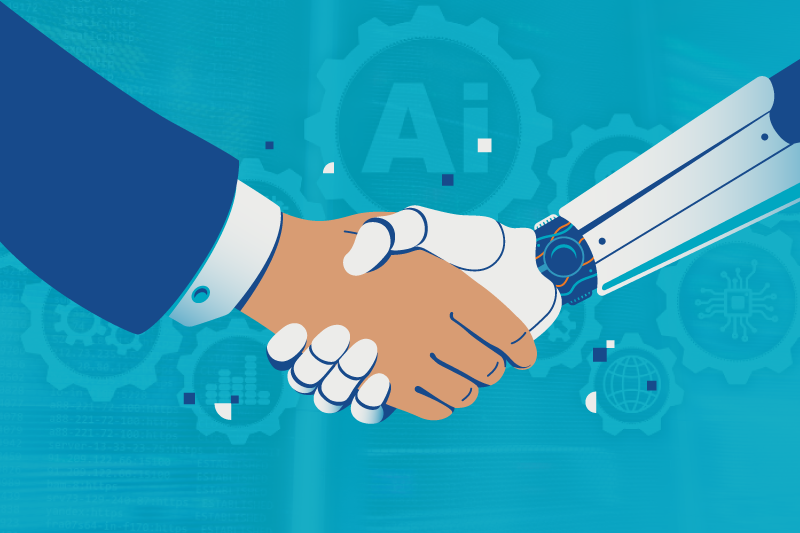March 27, 2024

Artificial intelligence (AI) is nothing new but has grown significantly over the last several years, ushering in a new era of game-changing capabilities and innovation for the manufacturing industry. The concept of AI offers more than just the buzz and hype of emerging technology —it is providing real value from which you can no longer walk away.
Let’s take a closer look at why that is, and how you can prepare your business for this change in our practical guide for AI implementation in manufacturing.
Understanding AI for Manufacturing: Where to Begin?
Assessing your current operations, upskilling your workforce, identifying inefficiencies, investing in new technology, and preparing for implementation are all critical steps for integrating AI into your manufacturing ecosystem.
But with so many considerations, where do you start?
● Look inward and start with your data. AI is highly data-dependent. That is why before you even think about the possibilities of AI improving your manufacturing processes, you need to get those processes right. To accomplish this, thoroughly assess your data and its quality, making sure it is ready to automate.
● Identify your primary challenges. Uncovering your primary pain points will help you establish clear goals and gain a better idea of what you hope to achieve with the implementation of AI for your manufacturing business.
● Understand how to properly leverage AI. This not only includes understanding what AI can do for your manufacturing business, but how to do it right. Going back to our first point: clean, organized data is key to effectively leveraging AI for your organization.
AI solutions can help dramatically enhance operational efficiency and decision-making processes, but the effectiveness is inherently tied to the quality of data you have to work with.
Can AI Be Trusted in Manufacturing?
The simple answer to this question is yes, but concerns about the trustworthiness of AI in manufacturing are misplaced.
The role of AI in Enterprise Resource Planning (ERP) systems, like Infor CloudSuite Industrial, takes advantage of cloud-based infrastructure, where data is securely hosted in the cloud. This is where AI operates for your manufacturing business: in a secure and isolated environment, safeguarded from the rest of the world. Unlike the public, generative AI tools that have surfaced which scrub information compounded from the whole internet (regardless of accuracy).
Your dedicated space in the cloud ensures that your data remains protected, leveraging some of the most robust security measures available. The real question then becomes: can you trust your data?
How AI Technology Impacts Manufacturing Businesses
With the power of AI technology, modern ERP systems are transforming manufacturing businesses by enhancing efficiency; reducing costs, improving accuracy, and helping them maintain lean operations.
But how does that work?
● Robotic Process Automation (RPA): This works by eliminating repetitive, manual tasks using rule-based models, boosting productivity and accuracy by reducing human error while also freeing up time for other strategic, value-added activities.
● Machine Learning (ML): By constantly analyzing historical data, we can improve predictions, gain better operational and financial visibility, and make decisions based on real-time information. In manufacturing, this could mean predicting machine failures before they happen, allowing for proactive maintenance and reducing costly downtime.
With outdated systems that do not utilize AI, things like predictive analysis can be performed, but it is time-consuming and costly. Implementing AI significantly reduces processing time, while simplifying complex manufacturing processes, which can be applied anywhere from financials to advanced planning and scheduling.
Tips for Choosing an AI Software Vendor
To get the most out of your investment in AI technology, you will want to be sure that you are fully leveraging your manufacturing software’s capabilities. Selecting the right AI software vendor becomes a valuable next step.
Here are some things to look out for when choosing a vendor:
● A best-in-class, unified solution. You want a platform versus a product. As the software grows and new tools deployed, you will have the support you need to integrate it into your existing systems with confidence.
● Designed to scale. We cannot expect AI to look the same several years from now. Technology will likely evolve, which is why a scalable solution will save you time and money in the long run.
● Deep industry experience. Find a partner who not only understands AI best practices but also knows the technical needs for discrete and process manufacturing. They should be able to ease you through implementation, reducing risk and driving business value.
AI is here to stay, and the future of manufacturing is inevitably connected to these emerging technologies. It is not just about keeping up; it is about leveraging AI to drive growth and outperform your competitors.
If you already have AI implemented but aren’t confident you’re fully benefiting from its capabilities, now is the time to reassess. Consider reaching out to our knowledgeable team for a free introductory health check to start the conversation. We can help you uncover hidden opportunities, fine-tune your current processes, and ensure that your systems are in alignment with your business objectives.
GET A FREE SYSTEM HEALTH CHECK
Ready to experience the value that AI can offer?
Guide is here to help you uncover hidden opportunities, fine-tune your current processes, and ensure that your systems are in alignment with your business objectives.
Complete this form to start the conversation.
